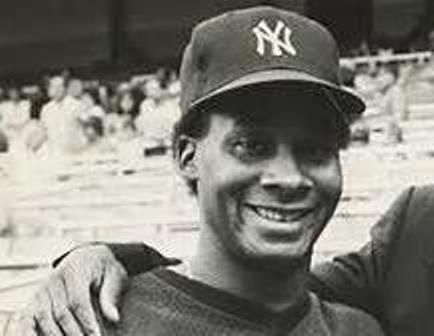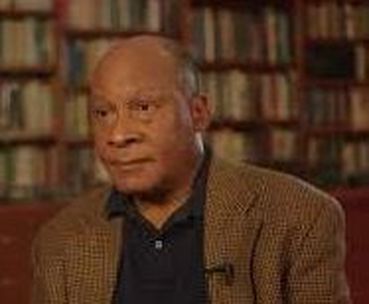|
In the Yankee clubhouse in 1967, a gaggle of sportswriters was waiting to interview somebody, standing around, cracking wise, or so we thought.
In a pause between our silly remarks, somebody dropped a droll remark, better than any of ours. Wish I could remember it right now. We “pressbox wags” looked around for the source of the witticism -- a lanky young man in a pinstriped uniform. “Who….are….you?” somebody asked. “The ball boy,” he said. He was also an African-American, the first to ever work in the clubhouse of the team that had taken forever to bring up Elston Howard in 1955. But these were not the same starchy old (white) Yankees of the past. The Yankees would suit up seven players of color in 1967 and had a number of free spirits like Joe Pepitone. So the lanky young man fit right into the be-yourself era of Lee MacPhail and Michael Burke. But who was he? Thad Mumford was a student at Fordham University, from Washington, D.C., and he was funny and self-assured in talking to the knights of the keyboard. We noticed he was also comfortable with the aging stars Mickey Mantle and Whitey Ford, and they with him. He did his job; he was….a presence. * * * Thad Mumford’s name was scrolled across the In Memoriam portion of the Emmy awards on TV the other night. He was honored as a trailblazing screenwriter for sitcoms in Hollywood – “M*A*S*H” notably, but many others. Thad died at 67 at his family home in Silver Springs, Md. on Sept. 6. * * * Thad had gone from dropping lines for free in the clubhouse to getting paid for putting lines out there for Hawkeye and Col. Potter and Hot-Lips Houlihan. He would show up for Old-Timers Day every year and put on a spare uniform and shag flies and generally be part of the merriment, listening to stories from Joe DiMaggio or Tommy Henrich or Dr. Bobby Brown. When Mantle and Ford became official Old-Timers, Thad gravitated to their corner of the clubhouse. They loved seeing him. “Hey, Thad, could you get us a beer?” Mantle asked one time. Thad was on his way, but Ford interrupted. “Slick,” he said to Mantle, using the nickname they (and Billy Martin) used among themselves, “Thad writes for “M*A*S*H.” Mantle was a loyal teammate and friend; he probably blushed deep red and started to apologize. Meantime, Thad got them a beer, with joy. * * * At some point, Thad stopped getting gigs in Hollywood, but he stayed out there. He wrote some articles on blacks in hockey and other issues for Kathleen McElroy, then the deputy sports editor at the NYT. “Oh, my goodness, I didn’t know, McElroy said in an email yesterday from Austin, where she is the director of the School of Journalism, Moody College School of Journalism, Moody College of Communication, University of Texas. “Thad and I had grand plans to start a magazine – back when magazines had their heyday,” Kathleen wrote. “We talked about calling it ‘Langston’ – a production focusing on African-American art and culture. Maybe it was just a great three-hour lunch, but dreaming about that magazine with Thad was one of the most invigorating days of my life. Our talks were always like that: frenetic, ideas bouncing from here to there, almost like musicians riffing off each other. Never a competition about who was the most erudite; it was more like ‘You know that song, too? Cool!’ We didn’t follow up, but sometimes the energy spent dreaming is just as worthwhile as the creation itself.” * * * Too bad “Langston” never happened. I know Thad kept up with Whitey for a long time, and I am told he was in touch with Bill White and Willie Randolph, who were nice to him. He shrugged off the laptop/smartphone age but every six or 12 months, he would call me and chat about the old days. I tried to get him to talk about his family, his life in LA, his work, but he was pretty opaque. I recently realized he hadn’t called in a while. I read in the obit that his father, a dentist, had passed in August and Thaddeus Quentin Mumford went back East for a visit….and died there. I don’t know anything more, except that I will miss his calls. * * * https://www.nytimes.com/2018/09/18/obituaries/thad-mumford-dies.html https://variety.com/2018/tv/news/thad-mumford-dead-dies-african-american-writer-mash-1202942657/
bruce
9/19/2018 08:43:30 pm
george,
George
9/21/2018 12:43:08 pm
Bruce, thanks for the nice words. I just spotted his name and face on the Obit page that morning, and had to write something. Maybe I was writing it for years. GV
bruce
9/21/2018 02:55:56 pm
george,
Altenir Silva
9/19/2018 10:43:58 pm
Dear George,
George Vecsey
9/21/2018 12:50:57 pm
Muito obrigado, Altenir. We were in our den, watching, that evening. I watched no shows from MASH and All in the Family to The Sopranos...and none since.
Altenir Silva
9/21/2018 06:10:22 pm
Dear George, 9/20/2018 12:57:55 pm
Wonderful piece, George. Never knew the connection. Great you were able to keep the friendship going with Thad over all these years. It gets harder. He left us way too soon. But M*A*S*H lives on, probably forever.
George Vecsey
9/21/2018 12:53:39 pm
Peter: I've had a lot of friends who could talk about the old days -- including my e-pal Big Al, Yankee fan from Queens, and Thad-- leave recently. We knew the same stuff. Who talks about Mickey and Whitey and Yogi (my childhood tormentors) these days? Fewer....GV 9/20/2018 04:42:45 pm
George--Just when I think that you have out done yourself, you do it again.
George Vecsey
9/21/2018 12:59:57 pm
Alan, not sure he ever was the bat boy. He was pretty firm about being the "ball boy." Maybe you had to work your way up....or maybe his schedule was fluid because of classes at Fordham or trips home to DC.
Ed Martin
9/21/2018 04:22:19 pm
As Quakers say, “Alan has spoken my words.” This kind of personal value expressed is how I first began to follow your writing. The community you have attracted speaks for itself.
George Vecsey
9/21/2018 05:10:50 pm
Ed, thanks for the kind words that mean a lot to me. I do think there was a village that was in touch with Thad.....including Bill White and Willie Randolph. In the end, people are a mystery......Best to you both,
Mike from Whitestone
9/26/2018 02:49:36 am
GV
George Vecsey
9/26/2018 08:16:43 am
George Vecsey( [email protected] )9/26/2018 08:02:55 am Comments are closed.
|
Categories
All
|











